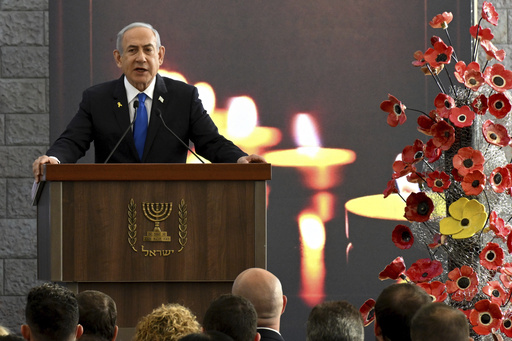
TEL AVIV, Israel — On Sunday, an Israeli court was deliberating whether to lift a gag order concerning a case involving suspected leaks of classified information linked to an associate of Prime Minister Benjamin Netanyahu. Critics argue that these leaks were intended to provide Netanyahu with political protection at a time when discussions for a cease-fire in Gaza had stalled.
Netanyahu has consistently refuted any allegations of misconduct, asserting that no members of his office are under arrest or investigation. He has chosen to downplay the situation and has publicly advocated for lifting the gag order.
Reports from Israeli media indicate that the controversy centers around classified information leaked to two European news organizations by an adviser who may not have had formal employment or the necessary security clearance. The identity of this individual has not been disclosed.
The Prime Minister stated that the individual involved “never participated in security discussions, was not privy to classified information, and did not engage in secret visits.” It is believed that the leaked documents contributed to a significantly disputed article published in the London-based Jewish Chronicle, which was subsequently withdrawn. This article falsely claimed that Hamas intended to facilitate the escape of hostages from Gaza to Egypt. Another article appearing in Germany’s Bild newspaper suggested that Hamas was prolonging negotiations as a psychological tactic against Israel.
Many within Israeli media and various observers have expressed doubt regarding these pieces, which seemingly aligned with Netanyahu’s calculations during the cease-fire negotiations while also allowing him to sidestep accountability for their collapse.
These articles were released as Netanyahu was pushing for extended Israeli oversight of the Philadelphi corridor at the Gaza-Egypt border, a demand he had initially made public over the summer. Hamas has rejected this demand, accusing Netanyahu of intentionally undermining the discussions mediated by the United States, Qatar, and Egypt.
Furthermore, the articles appeared to provide Netanyahu with political backing amidst a wave of criticism from the families of hostages and the broader Israeli public, who largely blame him for the failure to secure a deal. In September, criticism intensified with mass protests and demands for a general strike following the deaths of six hostages during an Israeli military operation.
A document from the court has verified that an investigation is currently being conducted by the police, military, and the Shin Bet internal security agency, leading to several arrests for questioning. This document stated that the situation poses “a risk to sensitive information and sources” and could undermine ongoing efforts related to the conflict in Gaza.
As the court ponders whether to lift the gag order on further aspects of the case, the scandal has already caused upheaval within the Jewish Chronicle, where notable columnists resigned in protest against the discredited articles. The publication eventually withdrew the controversial piece and other writings from a freelance journalist, expressing dissatisfaction with some of his claims.
The Bild article posited that Hamas was not earnestly engaging in negotiations and was employing psychological tactics to create divisions among Israelis. Following its publication, Netanyahu referenced it during a Cabinet meeting.
He defended the article in a statement over the weekend, asserting that it highlighted Hamas’s tactics to exert psychological pressure on the Israeli government and populace by assigning blame for the stalling negotiations.
Netanyahu has been keen to attribute the failures of the talks to Hamas, the group that launched an unprecedented attack into Israel on October 7, 2023, which sparked the current conflict. Hamas, still in possession of numerous hostages, has noted that any release would be contingent upon a sustainable cease-fire, a complete Israeli withdrawal from Gaza, and the release of numerous Palestinian prisoners.
Despite the killing of Hamas’s top leader Yahya Sinwar last month, the organization has maintained that its demands remain unchanged as negotiations facilitated by the U.S., Egypt, and Qatar seek to resume.
Frequently described by detractors as preoccupied with public image, Netanyahu is already facing trial for corruption in three separate cases, two of which involve allegations of providing favors to media magnates in return for favorable coverage.
His office has played down the recent controversy, claiming judicial bias and pointing out that numerous other leaks have occurred throughout the war. They also contend that the leak in question had no bearing on the cease-fire discussions.
“The document only contributed positively to the efforts to secure the return of the hostages, and certainly did not pose harm,” stated Netanyahu’s office in a communication on Saturday, adding that he became aware of the document only after it was made public.
Critics, however, maintain that the situation is far more serious, with one commentator in the pro-Netanyahu daily Israel Hayom referring to it as “one of the gravest affairs Israel has ever known.” They argue that the ramifications extend beyond national security, raising concerns that the Prime Minister’s office may have sought to sabotage a potential hostage agreement, which contradicts the broader objectives of the ongoing conflict.
